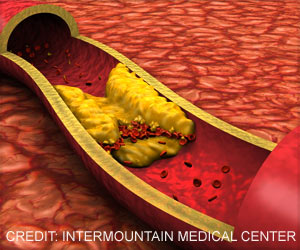A new technique that measures hundreds of molecular markers in the blood can confirm within minutes, rather than hours, whether a patient is having a heart attack.
A new technique that measures hundreds of molecular markers in the blood can confirm within minutes, rather than hours, whether a patient is having a heart attack.
Researchers from Massachusetts General Hospital (MGH) and the Broad Institute of Harvard and MIT say that speedy diagnosis of heart attacks can allow more rapid treatment that could limit damage to heart muscle.Published in the Journal of Clinical Investigation, the study suggests that the new technique can identify those molecular markers in the blood that are released when cardiac tissue is injured by a lack of oxygen.
"Right now there are no blood markers for reversible myocardial injury in clinical use, and the only available markers are not detectable until hours after the onset of tissue damage. Because our treatments for heart attacks are most effective in the first hours after symptoms occur, these newly identified markers could help us apply treatments sooner and help more patients," says the study's senior author, Dr. Robert Gerszten, of the MGH Division of Cardiology and Center for Immunology and Inflammatory Diseases.
Every metabolic activity in the body results in the production of metabolites, molecules released in often-minute quantities. A blood sample contains hundreds of these metabolites that could provide a chemical 'snapshot' of an individual's heath status.
During the study, the researchers took advantage of a procedure that is, in essence, a planned heart attack.
In a condition called hypertrophic cardiomyopathy, bloodflow out of the heart is obstructed by a massive thickening of the wall between the left and right sides, which can be.
Advertisement
The researchers say that taking blood samples before and after patients receive this procedure provides a unique window into metabolic changes that occur in response to the death of myocardial tissue, allowing study participants to act as their own controls.
Advertisement
The changes seen in the first 10 minutes persisted an hour later, and analysis of blood from veins in the coronary circulation confirmed that the heart was the source of the changes.
When the researchers compared the results of the 'planned' heart attacks with blood samples from patients with spontaneous coronary blockages, they found four metabolites that increased in response to ablation and also were elevated in patients with true heart attacks, confirming them as markers of myocardial damage.
The researchers also examined whether the newly identified metabolites had any effect on the response of cultured animal heart cells to reduced oxygen, and found that one metabolite increased cell death, while two others decreased it, possibly identifying a pathway for future therapies.
"This work is proof of principle that this new technology will work for diagnosis and may also help us find new targets for therapeutic intervention. Someday we may be able to reverse the damage from a heart attack with a 'cocktail' of protective metabolites," explains Gerszten, who is an associate professor of Medicine at Harvard Medical School and a senior associate member of the Broad Institute.
The MGH has filed a patent for the use of metabolic biomarkers to assess and reverse the kind of cardiac damage produced in a heart attack.
Source-ANI
SRM













